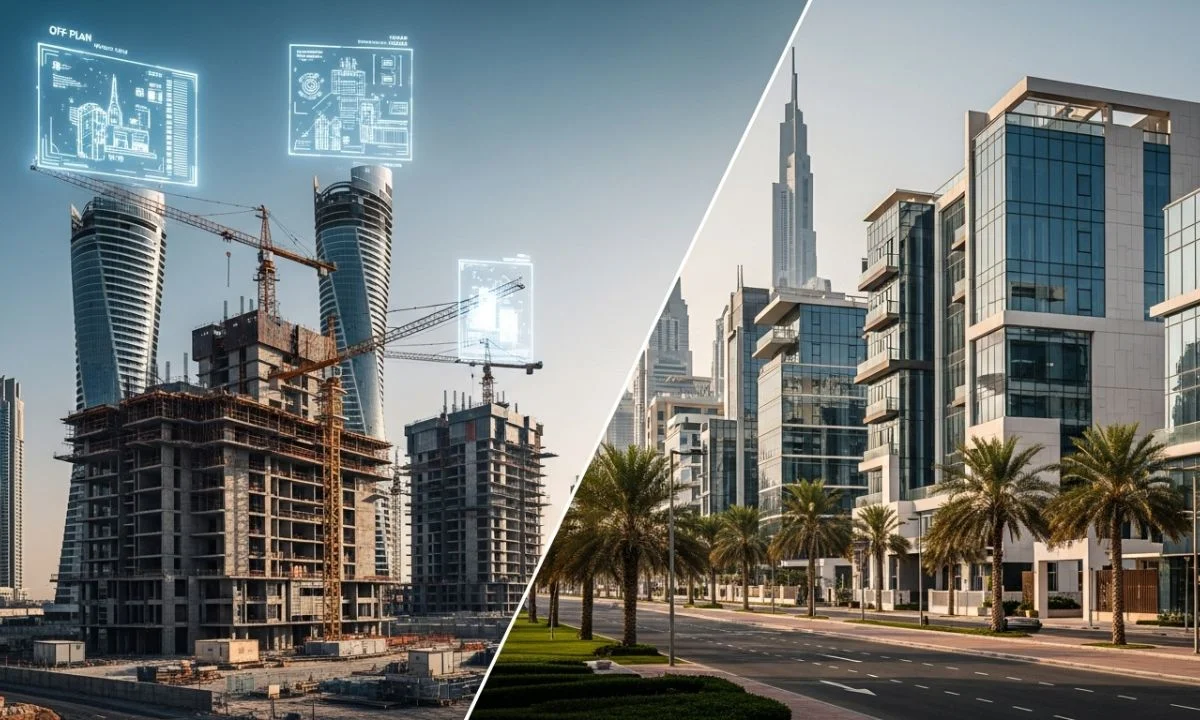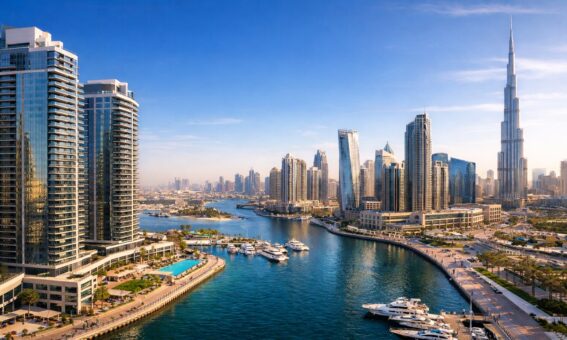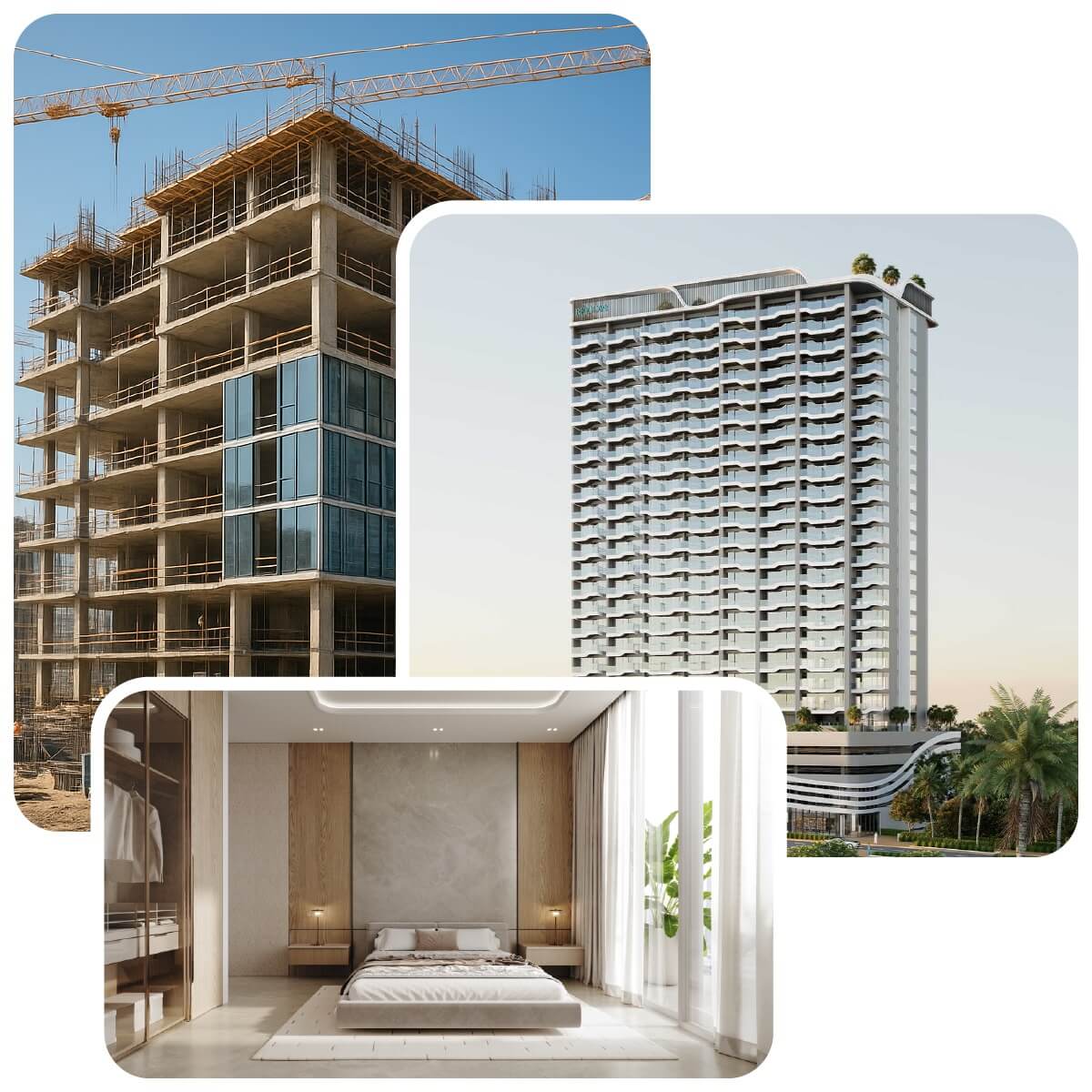
Dubai real estate in 2025 remains appealing to investors and end-users alike from across the globe. With its geographically strategic position, tax-free status, and rapidly expanding infrastructure, Dubai has emerged as a prime investment hotspot. The question that most frequently concerns buyers and investors nowadays is: Should you invest in an Off Plan vs Ready Property? Understanding the benefits and considerations of each option can help you make the most informed decision and maximize returns in Dubai’s dynamic property market.
While both options have their unique benefits, your decision depends on several factors, including your investment goals, risk appetite, budget, timeline, and expected returns. In this blog, we’ll provide a detailed comparison between off plan and ready properties in Dubai, examining the pros and cons of each in the current market scenario.
Off plan property refers to a property that is bought directly from a developer prior to its construction completion—or even its commencement. Payments are usually made in phases according to the construction schedule, and they receive the property following handover.
A ready property, however, also referred to as a secondary or resale property, is one that is completely built and available for occupation at once. The buyer is able to view what they are buying, start utilizing the property immediately, or commence collecting rental income.
Through 2025, the real estate market in Dubai is on the upswing, with off-plan purchases making up a substantial share of property sales. Off plan properties keep thriving due to favorable payment terms, reduced prices, and developer incentives. Dubai South, Jumeirah Village Circle (JVC), Business Bay, and Dubai Creek Harbour are experiencing an increase in off-plan launches.
In contrast, available properties within well-established neighborhoods such as Downtown Dubai, Dubai Marina, Palm Jumeirah, and Arabian Ranches continue to be highly desired by end-users as well as investors who want physical assets and direct returns.
The emphasis of the government on investor-friendly reforms such as long-term visas, tougher regulations via RERA (Real Estate Regulatory Authority), and stringent escrow laws has served to enhance buyer confidence in both segments.
One of the most attractive features of off plan properties is their affordability. These properties tend to be priced lower than completed homes, particularly during the pre-launch or initial construction phases. This makes it easier for buyers to acquire units at a better price, which tends to result in greater capital appreciation by the time the project is finished.
Conversely, ready properties are more costly initially. Purchasers usually have to pay the entire amount—or obtain a mortgage—at closing. Although the purchase price is higher, the house is already ready for occupancy, and there is no waiting time.
Off-plan properties also provide payment flexibility and developer support schemes. Most developers design payment terms over 2 to 5 years, with post-handover payment terms, where you can still pay even after occupation. This setup suits investors or end-users who want to stagger payments without having to take big loans.
Ready properties, though, often demand advance payments or bank mortgages. When you’re financing with a mortgage, you’ll have to qualify for bank financing and be prepared to pay related charges, such as down payments, interest, and fees.
In terms of rental yield, ready properties are at an advantage. As they are already finished, you can start earning rental income right away after buying. This is especially useful for investors who want cash flow with a predictable stream.
Off-plan properties, however, do not accrue rental income until handover. Although they can generate greater long-term appreciation, buyers have to hold out for the construction to be completed, which can take several years, depending on the project.
Off-plan property investment provides opportunities for buyers to join the market at a reduced price, usually in emerging neighborhoods that will develop further. As infrastructure is rolled out—new metro stops, schools, parks, and malls—the properties tend to increase in value by the point of delivery. This value potential makes off-plan suitable for investors with a medium- to long-term perspective.
By comparison, ready properties—particularly in established, mature communities—will probably provide more stable, albeit slower, capital appreciation. As the area infrastructure has been built, appreciation in price is more predictable and incremental.
Off-plan investments inherently carry higher risk. Factors such as project delays, changes in market conditions, quality discrepancies, or even the financial stability of the developer can affect your investment. While Dubai’s real estate market is highly regulated and developers are required to register with RERA and manage funds through escrow accounts, there is still some level of risk.
With ready properties, you are purchasing a finished unit. You can view the property, inspect its quality, look at the community, and get to see the finishes and views in person. This decreases uncertainty, so ready properties look more attractive to risk-averse buyers.
Need help finding the Property?
Off-plan properties usually have the most updated architectural designs, contemporary amenities, and smart home technology. The developers are concentrating on creating sustainable, technology-enabled, and wellness-oriented communities to fulfill the demands of current purchasers.
Ready properties that are older might lack sophistication unless just refurbished. But newer ready units within newer completed developments do compare well with off-plan in terms of finish and features.
If your aim is to get in as soon as possible, a ready property is the obvious option. It provides for immediate occupation and, in the case of investors, swift rental returns.
If you have a long-term investment strategy, are prepared to wait, and want to realize top capital growth, an off-plan property could be more suitable. The fact that you can invest at a lower price, with future appreciation in community development, provides for excellent upside potential.
Banks do finance off-plan property in Dubai, but mortgage opportunities tend to be less extensive than for ready homes. Many developers provide in-house financing or relaxed post-handover payment arrangements, easing the process for buyers who don’t have immediate access to full funds.
Ready properties, on the other hand, qualify for standard mortgages with more ease, allowing buyers more options and faster processing.
Off plan properties often come with restrictions on resale before a certain percentage of the property has been paid off (typically 30–40%). This limits your exit options if market conditions shift or your plans change.
Ready properties, however, can be resold at any time after transfer, allowing for more flexibility. This is particularly advantageous in volatile markets where investors may want to adjust their portfolio quickly.
Off-plan properties tend to be situated in up-and-coming districts or newer master developments, with infrastructure and community amenities still being developed. In this case, you are investing in the future potential of the district.
Ready properties tend to be situated in mature and established communities with existing infrastructure, schools, hospitals, shopping malls, and transport networks. For families or people who need convenience and a tried-and-tested lifestyle, ready houses provide greater assurance.
Whether you’re considering an off-plan investment or a ready property, working with an experienced team can make the process easier and safer. Off Plan Dubai Property has helped thousands of investors and homebuyers navigate the Dubai real estate market with confidence.
With pre-launch projects on offer, special payment schemes, and authenticated developer collaborations, they help consumers make wise decisions based on real-time market intelligence. Their experts assist customers at every step—from shortlisting properties to final handover as well as post-purchase services such as rentals and resale.
Ultimately, whether you buy off-plan or ready property in Dubai depends on your own ambitions and understanding of Off Plan vs Ready Property.
Select an off-plan property if you are interested in long-term returns, prefer to enter at a lower price level, and have patience for delayed returns. It’s best for patient investors who are willing to take higher risks, making off-plan investments a key part of the Off Plan vs Ready Property debate.
Opt for ready property if you value quick rental income, less risk, quicker occupancy, or prefer residing in a settled location. Considering Off Plan vs Ready Property helps you weigh the advantages and disadvantages of each choice. It’s a riskier option, but more suitable for first-time buyers or those who want to move in quickly.
Where feasible, diversify your real estate holdings by having both types of properties. This strategy balances risk, captures capital growth, and provides steady cash flow, giving you the best of Off Plan vs Ready Property options in Dubai’s dynamic market.






Are you looking for a perfect property in Dubai? Get in touch to discover the best off-plan opportunities available today.
Copyright © 2026 offplandubaiproperty. All rights reserved.